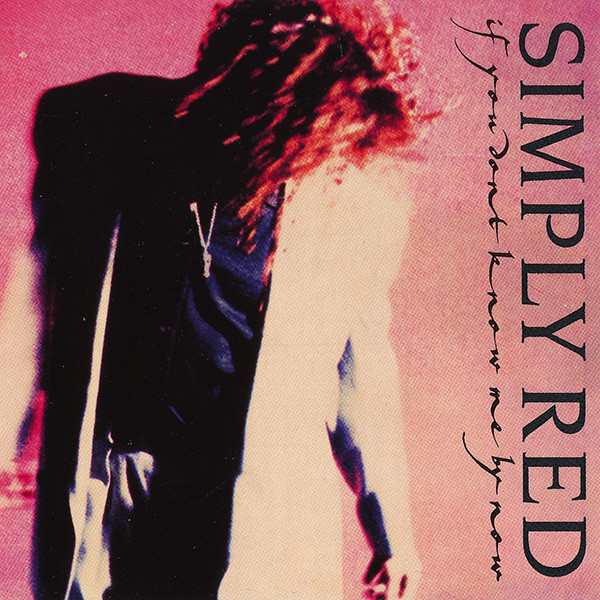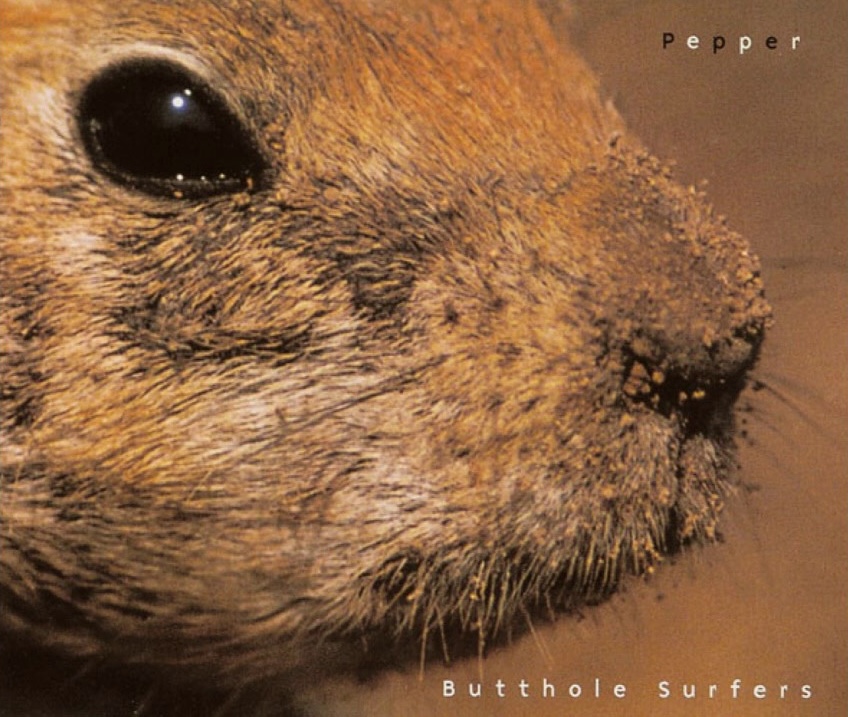July 15, 1989
- STAYED AT #1:1 Week
In The Number Ones, I'm reviewing every single #1 single in the history of the Billboard Hot 100, starting with the chart's beginning, in 1958, and working my way up into the present.
If you were a white male British singer who could semi-plausibly pull off some imitation of Black American soul music, then the late '80s were an amazing time to be alive. It could really be just about any era of R&B; you just had to do your own buttoned-up version of it, and you were golden. Phil Collins did early-'60s Motown. Rick Astley did a cheap plastic Big Lots version of hi-NRG post-disco. George Michael did up-to-the-minute dance-funk. New Kids On The Block -- not British, but pale enough to be British -- did New Edition. All of them made #1 hits. For a weird little stretch of time, there might've been more white British singers imitating Black music than actual Black musicians at #1. That's not ideal.
A vast chunk of the history of popular music in America is a saga of the white singers who successfully imitated Black singers. Appropriation is baked in. Every once in a while, though, that appropriation becomes glaringly blatant. Eventually, for instance, this column will get into the bleak early-'10s stretch where the most successful pop-chart rappers were people like Macklemore and Iggy Azalea. From a certain perspective, the late '80s look a bit like that. Plenty of exciting records made it to #1 in 1989, and plenty of those exciting records came from artists of color. At the same time, though, the pop charts were choked with pale imitations of great R&B artists. On that list, you won't find too many examples as unfortunate as Simply Red's version of "If You Don't Know Me By Now."
By the time Simply Red got ahold of "If You Don't Know Me By Now," the song was a much-loved classic of a bygone era. "If You Don't Know Me By Now" was one of the definitive Philly soul tracks of the early '70s. Kenny Gamble and Leon Huff, the songwriting and production team behind that whole plush, string-soaked pre-disco sound, wrote "If You Don't Know Me By Now" for previous Number Ones artists Labelle. The group turned the song down, though Patti LaBelle later made it a staple of her live shows. Instead, Gamble and Huff gave "If You Don't Know Me By Now" to Harold Melvin & The Blue Notes, one of the groups on their Philadelphia International label, and it became the Blue Notes' signature hit.
Harold Melvin & The Blue Notes had started in the '50s, first calling themselves the Charlamagnes and then changing their name to the Blue Notes. The group's lineup changed constantly, and they didn't become stars until they joined Philadelphia International, a label that had a whole lot of success with records from long-struggling nightclub acts. Harold Melvin was the group's longest-tenured member, but he wasn't their frontman. Instead, 20-year-old Teddy Pendergrass became the drummer for the Blue Notes' backing band in 1970. Later that same year, Blue Notes lead singer John Atkins left the group, and Pendergrass pulled a Phil Collins, stepping out from behind the drum kit and taking over lead-vocal duties. (Collins himself hadn't made the move yet, so maybe Phil Collins pulled a Teddy Pendergrass.)
Harold Melvin & The Blue Notes signed with Philadelphia International in 1972, the same year that the group recorded Gamble and Huff's "If You Don't Know Me By Now." It's a slow, simmering song about the tensions in a relationship. Pendergrass plays a guy whose partner doesn't trust him, and he wails out his resentments: "Just get yourself together, or we might as well say goodbye/ What good is a love affair when we can't see eye to eye?" Listening, you get the feeling that Pendergrass protests too much, that maybe his partner has good reasons for not trusting him. But Pendergrass brings a fiery passion to the song; he sounds like he's falling apart in the studio.
"If You Don't Know Me By Now" is a chance for Pendergrass to put on a fireworks display with his vocals, and that's what he does. He rasps and howls and pleads and delivers some spoken-word lines with the deep, resonant assurance of a great radio DJ. Without Pendergrass in the lead, "If You Don't Know Me By Now" would be a pretty boring song. Even with him, I don't count it as one of Gamble and Huff's best. But the song is an absolute star turn; it lets Pendergrass take us into space. "If You Don't Know Me By Now" quickly became the Blue Notes' biggest hit, topping the R&B chart and reaching #3 on the Hot 100. (It's a 7.)
For the next few years, the Blue Notes continued to rack up R&B hits and to find occasional crossover success on the Hot 100. (One more single, 1973's "The Love I Lost," made the top 10, peaking at #7. It's an 8.) They also recorded the original version of "Don't Leave Me This Way," the disco classic that Thelma Houston took to #1 in 1977. In 1976, though, Teddy Pendergrass, clashing with Harold Melvin over money, quit the group and went solo. The Blue Notes remained together in one form or another until Melvin died in 1997, but they were never a force without Pendergrass.
Teddy Pendergrass went on to a huge R&B career, though he rarely ever crossed over to the pop charts. (On the Hot 100, Pendergrass' highest-charting single, 1978's "Close The Door," peaked at #25.) Pendergrass' career almost ended one night in 1982, when his brakes failed and he crashed his car into a guardrail and a pair of trees, leaving him paralyzed from the chest down. But Pendergrass mounted a comeback a couple of years later. He'd never walk again, but he could still sing. In 1984, Pendergrass helped introduce Whitney Houston to the world with the duet "Hold Me." ("Hold Me" peaked at #46.) A year later, Pendergrass made an emotional return to the stage at Live Aid in his Philadelphia hometown. He finally died of respiratory failure in 2009, at the age of 59.
Point is: By 1989, Teddy Pendergrass was a living legend and a wounded veteran of a very different time in pop-music history. To sing a Teddy Pendergrass song -- especially as a white guy, and especially through the synthed-out filter of late-'80s production -- was an incredible act of hubris. It was a ridiculous thing to do. But Mick Hucknall thought he was up to it.
When Hucknall's group Simply Red made it to #1 with "Holding Back The Years" in 1986, they got away with something. Hucknall, a great admirer of American soul music, made a searching and downbeat lament that connected with Black American audiences enough that rappers kept quoting and sampling it for years afterwards. That one hit didn't exactly turn Hucknall into a star. When Simply Red released their 1987 album Men And Women, lead single "The Right Thing" peaked at #27. When they followed it with A New Flame in 1989, lead single "A New Love" only made it to #57. Hucknall himself was surprised when his group's version of "If You Don't Know Me By Now," the second single from A New Flame, surpassed the Blue Notes' original and became Simply Red's second American chart-topper.
In the years after "Holding Back The Years," Simply Red moved away from the leftist political commentary of their early singles and eased into a smooth adult-contempo soul sound. Working on A New Flame, they reconnected with the American producer Stuart Levine, the former jazz saxophonist who'd produced "Holding Back The Years." Hucknall and Levine went out to dinner one night in London to figure out which songs would make the album, and one of them hit upon the idea of covering "If You Don't Know Me By Now." They went for it.
In recording the song, Levine made a conscious decision to avoid listening to the Blue Notes' original until Simply Red's version was done. Levine knew that Simply Red's version of the song would never be the definitive one. In Fred Bronson's Billboard Book Of Number 1 Hits, Levine says, "You don't think of that song without thinking of Teddy Pendergrass." He also says that his intention was to make a spare and simple version of the song, without the orchestral reach of the original. (In the Bronson book, Levine says that the original was "produced to death," though he also clarifies that it was "a great production.")
Levine's impulse was probably the right one. He knew he couldn't beat Kenny Gamble and Leon Huff at their own game, so he gave the track a sparse arrangement: A murmuring bass, a few spaced-out drum-cracks, some melodramatic piano-tinkles. There are no strings or screaming saxophones on Simply Red's version of the song, and that sparseness probably fits Hucknall's voice better. But then, the real right decision for Simply Red's version of "If You Don't Know Me By Now" would be to just not record the song at all. Mick Hucknall is a lot of things, but he is not Teddy Pendergrass. Hearing him sing a song that belongs to Pendergrass is frankly embarrassing.
In the limited category of white British soul singers, Mick Hucknall is plenty talented. He can hit big notes, and he can sound like he means them. But singing a famous American soul song -- especially one made famous by a force-of-nature singer like Pendergrass -- Hucknall sounds like he's playing dressup. Hucknall tries to pull off all the same showy vocal grandstanding that Pendergrass does on the original, and he's just not up to it. Where Pendergrass sounded like a man desperate to save his "happy home," Hucknall just sounds like a shitty, whiny boyfriend. He has absolutely no gravitas.
When I was a kid, I saw Simply Red do "If You Don't Know Me By Now" on the British show Top Of The Pops. This was the moment that I was discovering pop music, and I pretty much liked everything I was hearing. Jason Donovan? Bros? D-Mob? Poison? Robert Palmer? The The? De La Soul? Lisa Stansfield? I was into it. I thought everything on Top Of The Pops was cool. I looked forward to Thursday nights with a fervor that probably scared my parents. But watching Simply Red, I was bored. They sucked. During that one year that I lived in England, I can't remember any other performances where I wished someone would just shut the fuck up and stop playing, but that's how I felt about Simply Red. That's still how I feel about Simply Red.
Blessedly, Simply Red did not remain a pop-chart concern in America after "If You Don't Know Me By Now" had its week at #1. A couple of the singles from the group's 1991 album Stars made the Hot 100, and the vaguely house-influenced "Something Got Me Started" made it as high as #23. After that, though, Simply Red never appeared on the Hot 100 again. By this point, Hucknall was truly feeling himself. He started referring to Simply Red as a solo project, and that's what it really became eventually. One by one, Hucknall's bandmates all left the group, replaced by relatively anonymous figures. (Trumpeter and keyboardist Tim Kellett went on to form the dance-pop project Olive, whose highest-charting single, the 1997 UK chart-topper "You're Not Alone," peaked at #56 on the Hot 100.)
Hucknall has intermittently kept Simply Red going up into the present; their most recent album, the lazily titled Blue Eyed Soul, came out in 2019. These days, Hucknall lives in a castle in Scotland. I hope he's happy there, and I hope I never have any reason to pay attention to his shitass music again.
GRADE: 2/10
BONUS BEATS: This section is always a bit tricky when it comes to cover songs. If someone else comes out with a version of "If You Don't Know Me By Now," for instance, it seems fair to assume that they're basing it on the Harold Melvin & The Blue Notes original, not on the Simply Red version. But there's at least one version of "If You Don't Know Me By Now" that's fully and completely based on the Simply Red cover. In 2003, the British version of The Office aired its Christmas special, and the show makes a plot point out of how Ricky Gervais' David Brent character blew all his money on releasing his own version of "If You Don't Know Me By Now." Here's the almost unendurable video for the David Brent version:
THE NUMBER TWOS: Madonna's urgent club manifesto "Express Yourself" peaked at #2 behind "If You Don't Know Me By Now." Chart peak aside, "Express Yourself" doesn't go for second best. It's a 10.






